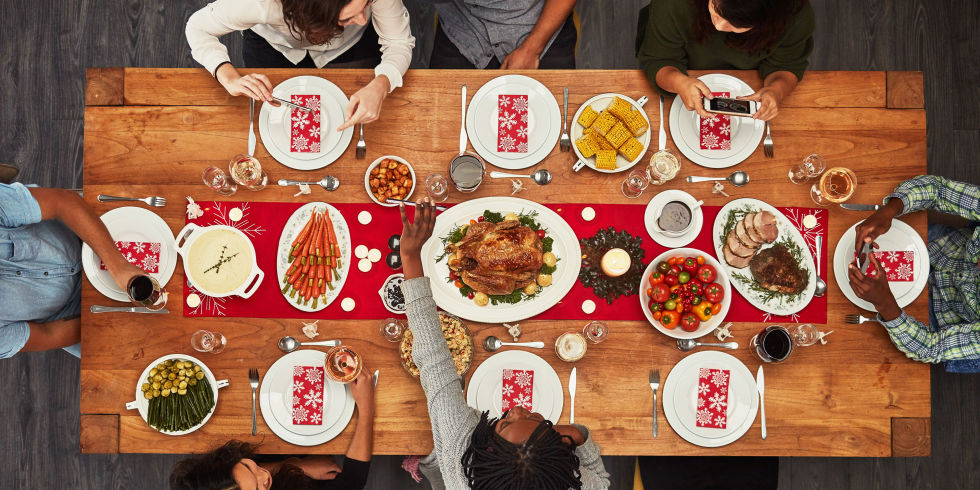There’s still a good few weeks to go before Christmas day but if, like us, the party season has already got you feeling a little worse-for-wear, take comfort in the fact that not all festive food is unhealthy.
Here, Helen Bond – consultant nutritionist on behalf of The Harley Medical Group – talks us through the Christmas bites that could help fight off winter illness and see you through to the 25th healthy, happy and glowing from the inside out.
Clementines
Festive easy-peelers shouldn’t just be used as decorations or stocking fillers, says Helen.
‘They’re rich in vitamin C, which helps to keep our immune and nervous system strong. Vitamin C is also needed to make collagen, which helps keep the skin smooth and supple and keeps our immune system in tip top working order.’
A medium clementine (60g) provides just 24 kcals, and will even contribute to your daily fluid intake.
Dried fruit
They might be a staple when it comes to mixing the Christmas cake, but dried figs and dates are also low-fat sources of fibre and make a delicious, healthy snack on their own.
‘Dried figs provide potassium, calcium, iron and magnesium. And don’t forget dried fruit can count towards your five-a-day – three dried dates or two dried figs count as one portion. The darker the fig’s skin, the more naturally occurring phytochemicals, such as polyphenols, flavonoids and anthocyanins, it contains.’
Salmon
If you’re one of those people who ONLY eats salmon as part of a slap-up Christmas breakfast, it’s time to think again.
‘Salmon give us omega-3 fats, essential fats that help to keep skin cells water tight and well hydrated and our hearts and brains healthy. Our bodies cannot make omega-3s, so you have to get them through diet.’
Salmon is also a great source of protein (48g of protein per salmon steak), which is important for making skin-boosting chemicals such as collagen.

Carrots
It’s no wonder Rudolph and the other reindeer can fly around the whole world in one night. Although they can’t really help us see in the dark, Helen says that carrots play a major part in keeping us healthy by boosting the immune system.
‘Scientists have also found beta-carotene may to help protect the skin against UV sun damage by providing an SPF effect and protecting the skin from the inside out! In addition, they provide fibre needed to keep the gut healthy.’
Having a portion (80g) of carrots with your Christmas lunch will count as one of your five-a-day.
Cranberries
Cranberry sauce is a Christmas dinner staple, but it could also help keep your heart healthy at other times of the year, too.
‘Naturally occurring anthocyanins in cranberries have been linked with healthier hearts and also strengthening those tiny blood vessel walls in our skin, which can help prevent those pesky thread veins. Plus there is some evidence that they may be beneficial for UTI prevention.’
Just be careful not to add too much sugar to this sour berry!
Brussels Sprouts
Love ’em or hate ’em, there’s no arguing that sprouts are a Christmas classic.
‘Sprouts belong to a group of vegetables called brassicas, which include broccoli, cauliflower and cabbage. Sprouts are rich in vitamins C, B6 and folic acid – all contribute to a healthy immune system.’
Just nine sprouts count as a portion and one of your five-a-day.

Chestnuts
Whether you roast them on an open fire or form part of your turkey stuffing, chestnuts have the lowest fat and calorie content of any nut– just 2.7g per 100g and 170 kcals. Plus they contain gut healthy fibre, skin friendly B vitamins and blood pressure regulating potassium.
Turkey
We couldn’t go without giving the bird of the moment a special mention! Turkey is a year-round favourite among health and fitness experts alike, and for good reason. Helen says:
‘Not only is this meat low in fat and saturated fat, but it’s also a great source of zinc, a mineral important for healthy skin, and high in lean protein (31g (63% RI) of protein per large slice) – one of the building blocks of collagen. One slice provides 140kcals and just 1.5g fat.’












